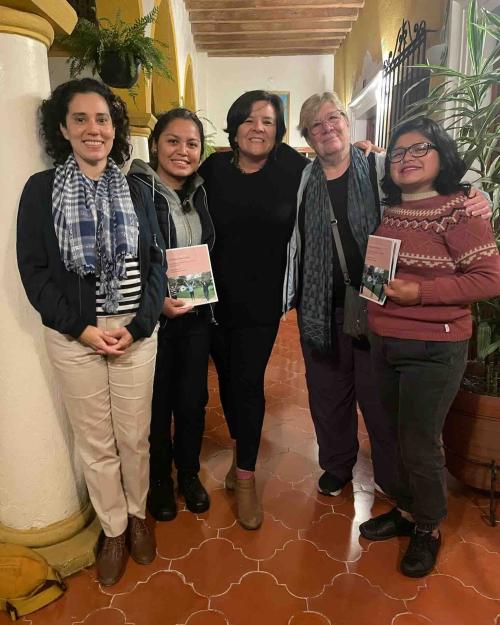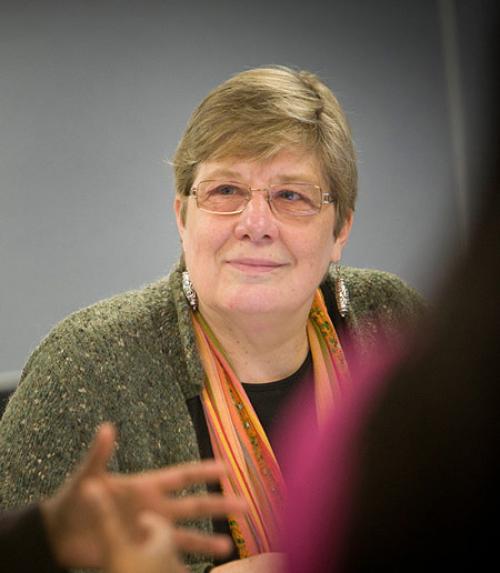Professor Debra Castillo, Stephen H. Weiss presidential fellow and Emerson Hinchliff professor of Hispanic Studies in the College of Arts & Sciences, died Oct. 5 at the age of 72.
Castillo’s scholarship focused on migration, border studies and Latin American and Latinx literary and cultural studies. She published more than 150 articles and more than 20 books as author, editor or translator. She was also deeply devoted to Latina/o/x students at Cornell and to community projects in Ithaca and around the world and was the founder of the well-respected theater troupe Teatrotaller, which has presented work throughout the U.S. and abroad.
“People across the hemisphere and the world will feel her absence,” said Mary Pat Brady, director of the American Studies Program, professor of literatures in English and past director of Cornell’s Latina/o Studies program (LSP). “She was generous, energetic, kind, incredibly knowledgeable and fiercely devoted to her students; to Latina, Latin American, Caribbean feminist creative practices of every kind; and to the Latina/o Studies Program here at Cornell.”

Castillo specialized in contemporary narrative from the Spanish-speaking world (including the United States), gender studies and cultural theory.
“Debra Castillo was a globally-recognized and widely accomplished scholar of Latin American studies, including foundational works on Latin American feminism, literary criticism and theory, gender in the Americas, migration studies, the studies of borders and environment,” said Gavin Walker, professor and chair of the Department of Comparative Literature. “Her productivity as a writer, including dozens of books and hundreds of articles, was matched by her pivotal editorial work and leadership for the Latin American Literary Review, diacritics, and the Latin American Studies Association, for which she was a past president.”
“She made us feel that the academic life was only one part of everything, that one could be intellectually ambitious with grace, giving always priority to the creation of a community everywhere she went,” said Edmundo Paz-Soldan, Distinguished Professor of Arts & Sciences in Latin American Literature in the Department of Romance Studies (A&S). Castillo was on Paz-Soldan’s search committee and became one of his mentors and collaborators once he arrived on campus.
“Debbie was way ahead of her times because her scholarship was always to build something that would last for generations,” said Anindita Banerjee, associate professor of comparative literature, who collaborated with Castillo on many projects. “She knew what the core mission of the university was and she did just that — preparing humans to be citizens of the world.”
Castillo’s most recent books were “The Scholar as Human," with Anna Sims Bartel, and “Scholars in COVID times,” with Melissa Castillo-Planas, her daughter. She also served as editor for many academic journals and was one of the creators and the current director of the migrations studies minor at Cornell, part of the Einaudi Center for International Studies.
“Deb was one of the most generous people I’ve met at Cornell. Over the years, I saw how she worked behind the scenes to advocate on behalf of colleagues, students and programs,” said Maria Cristina Garcia, Howard A. Newman Professor of American Studies and Stephen H. Weiss Presidential Fellow in the Department of History. “She was one of LSP’s indefatigable advocates and one of our most popular teachers, one of the reasons we have survived for over 30 years.”
Liliana Colanzi, associate professor of Romance studies, co-edited a volume with Castillo, “Regiones inquietantes: literatura de horror en Latinoamérica” and said she was widely considered one of the founding figures of U.S. Mexicanism.
“I have never met another person with that inexhaustible capacity for work, that ever-expanding intellectual curiosity, that kind and compassionate gaze toward others, and that unwavering sense of service,” she said. “Her life was devoted to building community, both within and beyond academia. Debbie was an example of generosity and service to others, of openness and largeness of spirit: she always had more patience and a better heart than the rest of us.”
Juan Manuel Aldape Muñoz, assistant professor of performing and media arts, met Castillo when he came to Cornell as a Mellon postdoctoral fellow.
“It was the height of the COVID-19 pandemic, and the campus felt like a ghost town—but not with Debbie. She made her home, her colleagues, and her artistic community ours,” he said. “Debbie understood the importance of supporting emerging Latine scholars within and beyond the university. She checked in regularly with me during my son’s unexpected medical treatment. She was present at all the talks I gave on campus and offered sharp yet kind feedback—at times willing to serve as a respondent.”
Castillo approached Anna Sims Bartel MA ’97 PhD ’01, to work with her on the Mellon Diversity Seminar in 2016, even though Bartels’ role as a staff member (not faculty) would have normally prevented that. The effort resulted in a seminar, The Scholar as Human, a book and an ongoing book series.
“She didn’t talk about supporting leadership so much as she gave people opportunities to lead,” Bartels said. “In an unequal world, that’s a very big deal. The academy can be a harsh place, but she brought humor, generosity, and light to it, lifting up what worked, creating opportunities for new capacity, and envisioning the better world she built.”
Castillo was the former president of the Latin American Studies Organization and La Asociación de Estudios de Género y Sexualidades. She was also a member of several editorial board presses, including the Cornell University Press, the North Carolina Series in Romance Languages and Literatures and the State University of New York Press.
"I don't know a Cornell without Deb Castillo. It feels surreal,” said Karen Jaime, associate professor of performing and media arts, who was Castillo’s advisee as a Cornell undergraduate. “Her passing is an incredible loss for our community, and my condolences go out to all of her former students, her colleagues, and most of all her two children, Carlos and Melissa. What an incredible legacy."
Carolina Osorio Gil ’02 PhD ’25, worked with Castillo in Teatrotaller as an undergrad and continued to collaborate with her, including on research in Chiapas, Mexico, where they worked on leadership programming with women around water management and governance.
“Debbie was beyond brilliant - both intellectually and as a person,” she said. “She taught me what it means to collaborate with grace, do work en comunidad (in community) on and off campus and globally, and how to be a scholar with humanity and humility.”
Jimmy Noriega Ph.D. ’11 asked Castillo to co-chair his thesis committee and traveled with her on more than a dozen productions as part of Teatrotaller.
“On our trips, we climbed a volcano together, we cooked together, we learned Quechua, and we created friendships with amazing artists,” he said. “Debbie loved to explore new cities and share in cross-cultural exchanges, demonstrating through joy and experimentation what important cultural work could look like.”
Castillo began teaching at Cornell in 1985 and became actively engaged in community projects with the Latino Civic Association of Tompkins County; No Más Lágrimas, which helps supply food and other basic needs; and other groups. She collaborated on numerous local projects that focused on sharing Latin American and U.S. Latino/a/x culture with community members, including the April 2025 event, “We Are La Voz,” a month-long event focused on Latine artists.
“I still remember the first time I met her. She bought one of my paintings, and from that moment, she believed in me,” said Yen Ospina, a Colombian-American artist and president of Ithaca’s Latino Civic Association, who organized the La Voz event. “I remember her telling me later how impressed she was that I took her idea and turned it into something bigger — a project that celebrated resilience through art and built community through creativity. That was who Debra was — she gave you a seed of an idea and trusted you to make it grow.”
Castillo created Teatrotaller in 1993 from her course on Hispanic theater production. The troupe focuses on theatre from Spanish, Latin American and U.S. Latino/a/x traditions and develops original plays. It has presented work at various universities and festivals across the U.S. and in Mexico, Canada, India and other countries.
In 2022, that troupe produced an original play written by Ana Lopez Ulloa ‘11, "Diamantina rosa," which focused on gender violence in Mexico and the feminist movement in Latin America.
“She was our spokesperson, our angel, our ally,” said Lopez Ulloa, who came to the U.S. from Mexico in 2007. Though Castillo was not Latina, “she fell in love with our culture in the most, pure amazing way.”
Her support for students was extensive, Lopez Ulloa said, sharing stories of dinners at Castillo’s house, advice on careers and relationships and encouragement when things were going poorly.
“She took the time to read what we had to say,” she said. “She had no reason to look at us, but she did.”
During her time as director of Cornell’s Latin American Studies Program, Castillo worked closely with Mary Jo Dudley, then associate director of that program, who went on to run the Cornell Migrant Farmworker Program (now the Cornell Farmworker Program). The pair edited books together, co-taught a course that included a January break trip for students to Mexico and worked with a group of Spanish-speaking students on a skit about what to do if workers were stopped by immigration officials.
“Debbie perceived of the opportunity of theater to help a low-literacy population address a very critical and difficult topic,” Dudley said. “She would do her part with a lens of what everyone else brought to the table.”
Castillo worked with more than 130 graduate students during her career, chairing or co-chairing more than 60 graduate student committees. And she was a champion to undergraduates.
Kety Esquivel ’97, met Castillo as a first-year student as she and other students were processing events of the 1993 Day Hall takeover, when Latinx students pushed for the creation of the Latino Living Center, stronger support for the fledgling LSP and other changes.
“I remember spending many days at their home, discussing politics in Spanish and English, and listening to rancheras that reminded me of the music played in my own Mexican-American home in upstate New York,” said Esquivel, president of the Cornell Latino Alumni Association. “Although she was not a Latina herself, she advocated for our Latino community, for the students and for the Latino Studies Program and she did this tirelessly for over three decades.”
Castillo is survived by her children, Carlos and Melissa; as well as her mother, Eunice; and her five siblings, Mary, Karen, Lori, Jim and Dave.
A Celebration of Life will be held for Castillo on Nov. 2 from 1:30-4:30 p.m. at the Community School of Music & Arts (CSMA) on the third floor, 330 E. State St., Ithaca.
A version of this story also appeared on the Cornell Chronicle




